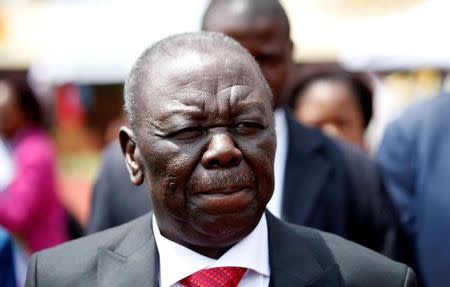L.A. Times reportedly sold to California billionaire
The Los Angeles Times, the largest newspaper in California, is being sold by the news company Tronc to the pharmaceutical billionaire Patrick Soon-Shiong, The Washington Post reported.
The Times itself reported a deal to sell the paper to Soon-Shiong was "close."
The move would give the paper local ownership for the first time since the Chandler family sold its parent company to Tribune Co. in 2000. Soon-Shiong, who is 63, would also acquire The San Diego Union-Tribune in the deal, according to the Post.
Neither a spokesperson for Soon-Shiong’s company nor Tronc responded to requests for comment.
Soon-Shiong, who was born in South Africa to parents of Chinese descent, is best known for his high-profile crusade to fight cancer by matching genetic drugs to particular tumors through a high-powered database. But he has recently expanded his assets to include management over seven hospitals, two public companies, and a stake of the Los Angeles Lakers, among other holdings.
Soon-Shiong has also been moving in political circles, having worked on a blue-ribbon panel for former Vice President Joe Biden’s “Cancer Moonshot.” After the election of President Donald Trump, Soon-Shiong was reportedly considered for multiple administration roles, including the head of the National Institutes of Health. He did not receive a job in the administration, but House Speaker Paul Ryan recently appointed him to an advisory panel on health-information technology.
The Los Angeles Times, one of the nation’s most storied newspapers, recently won acclaim for a wide-ranging investigation of OxyContin and alleged deceptive marketing of the safety of the painkiller that touched off the opioid crisis.
But the Times newsroom has been in turmoil recently, as the paper grapples with declining revenue. In August of last year, Tronc removed Editor Davan Maharaj and some of his top newsroom leaders in a purge designed to make the paper more receptive to innovation. But Maharaj’s successor, Lewis D’Vorkin, feuded with newly unionized staff in a turbulent tenure that ended Jan. 29. Meanwhile, the paper’s publisher, Ross Levinsohn, was placed on leave amid sexual harassment allegations.
Soon-Shiong has been a minority owner of Tronc and, according to some, has used the post to angle to purchase the Times. He has feuded with Tronc’s controlling shareholder Michael Ferro, leading one of the company’s lawyers to accuse Soon-Shiong in a letter last April of mounting a “strategy to coerce the company into selling the Los Angeles Times.” Soon-Shiong himself accused management of “poor corporate governance.”
While Soon-Shiong owes his fortune to a successful cancer drug, Abraxane, and a pair of pharmaceutical companies, he has scientific and economic interests in many areas. After his upbringing in South Africa, he moved to British Columbia and then Los Angeles to pursue a career as a surgeon. In Los Angeles, he developed an interest in curing Type 1 diabetes with transplanted pancreases. After a transplant with one diabetic patient raised hopes of a cure, laudatory media attention followed — which some, including the president of the American Diabetes Association at the time, felt overstepped the facts.
While a company built around diabetes research failed — and brought with it lawsuits from investors and family — Soon-Shiong was able to create a pair of successful drug companies. From there, he developed an interest in using genomics and information technology to combat cancer.
More recently, Soon-Shiong has faced accusations of conflicts of interest. Reporting by
POLITICO and STAT News questioned whether Soon-Shiong used his not-for-profit foundations’ resources to benefit his for-profit businesses. In one case, Soon-Shiong’s not-for-profits donated money to the University of Utah, which in turn purchased his company’s products. The deal led to Utah’s legislative auditor general concluding that the school violated state procurement laws.



